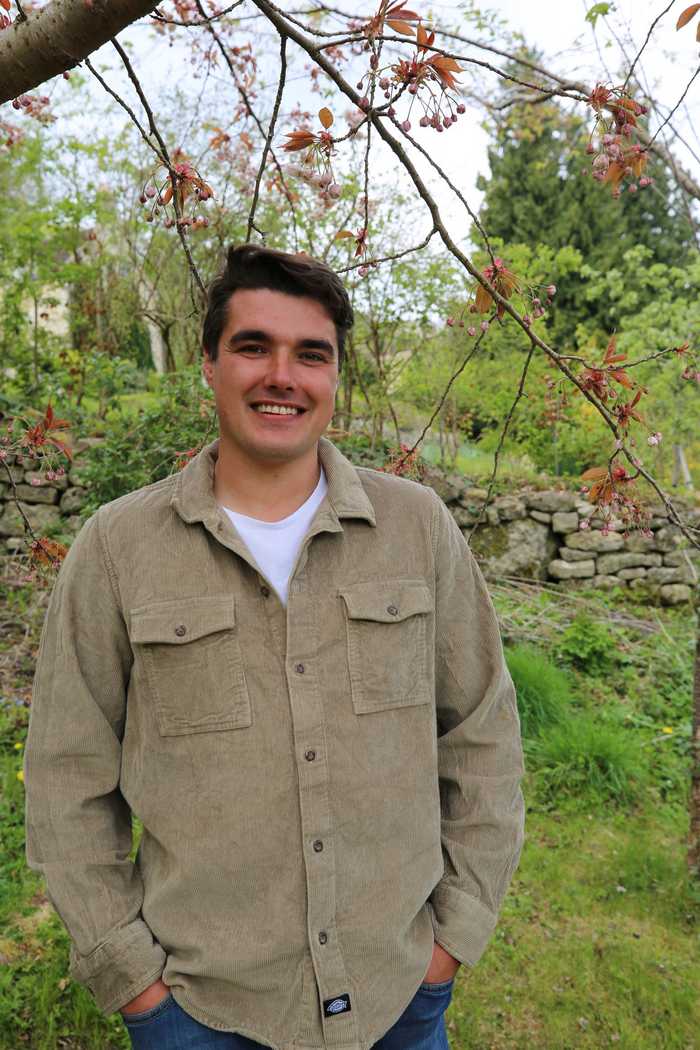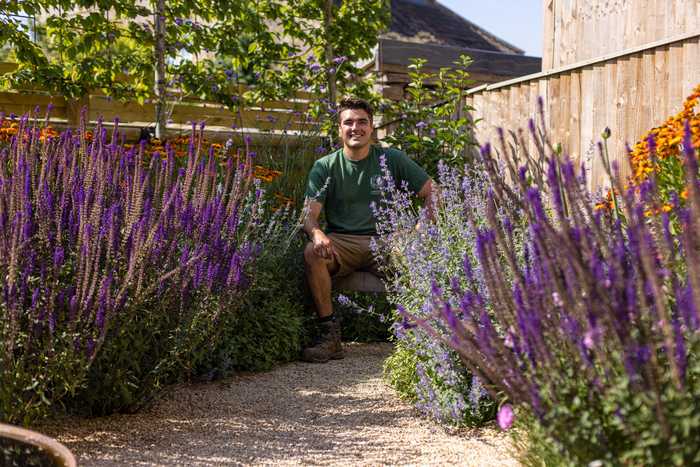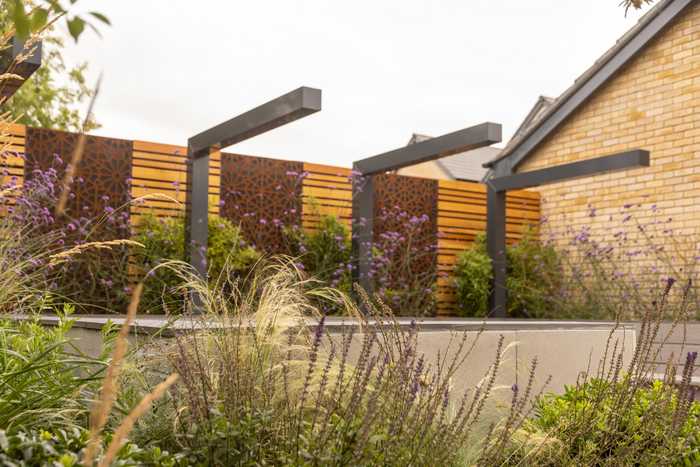Have a seat with...
Chris Hull
Chris Hull is an award-winning landscape garden designer and TV presenter on BBC’s Garden Rescue. Having worked in the industry for over a decade, Chris started his own Bath-based garden design company in 2019, Greenbook Landscape Design.
In today’s Have a Seat With, we get right into the weeds with Chris, talking about his early years in the world of horticulture, his work with the BBC, and his views on the importance of ecologically-responsible gardening. It’s well worth a read!

Hello, Chris, great to chat with you today!
Could you tell me a little bit about your journey into the world of garden design? Were you forever in the worms and mud as a child, or is it a passion that developed in later life?
I was lucky to grow up in Tavistock, Devon, which is surrounded by amazing countryside and woodland, with Dartmoor on one side and the Tamar Valley on another. I was always working outside even as a kid. I used to go to work with my stepdad who is a forester. I have lots of fond memories out with him logging, hedge laying and other great rural work!
We have never had a big garden, but my Mum always took pride in her plants and I would help her out. When I was 15, I got my first job as a gardener at a country house hotel, called The Horn of Plenty and I learnt a lot from the head gardeners there. Off the back of this, I picked up my own little round of garden maintenance jobs that I would do on the weekends, whilst working evenings after school in the hotel as a waiter! Never been shy of putting a good shift in…even if it was for £3 an hour.
I did great in GCSEs at school but I lacked direction in A-levels and didn't really bother with it. Following this, I then decided to study Countryside and Wildlife Management at Duchy College in Cornwall to further my study before going to University. This was a great insight into rural ecology and conservation work which inspires what I do to this day. Whilst studying there, I began working with John Bailey, a garden designer who has a passion for amazing and unusual plants, and helped him to develop his garden in Tuckermarsh, Devon. John has an amazing eye for little details, even in a large wild landscape and he taught me a lot about composition and pairing of plants. It was also fascinating to see some of the unbelievable bamboo and other exotic plants that other people weren't using! My time working there really boosted my enthusiasm for garden design.
Following this, I then studied Garden Design at Sparsholt college and worked with some amazing tutors who helped to further my study which ultimately enabled me to land my first job as a designer after my degree! This was in a design practice in Bournemouth where I worked my way up from CAD technician to Senior Designer. The company then decided to reduce its size and I then set up on my own as Greenbook Landscape Design.
What does an average working day look like for you?
What I love about the way I work is that no two days are the same. A lot of designers just do design along with some site meetings and the like, whilst landscapers are always out on-site grinding away. I have a great balance of doing both designing and running soft landscaping work. I get very uptight if I'm stuck on the computer for a long time, so being able to get out on the tools, sticking plants in the ground or doing some timber work really makes the difference for me.
One day I might be working on creative garden designs, another I might be doing commercial planning drawings or another I might be out sowing a wildflower meadow!

"I get very uptight if I'm stuck on the computer for a long time, so being able to get out on the tools, sticking plants in the ground or doing some timber work really makes the difference for me! "
How does your background in ecology and conservation underpin each project you’re working on—is it the first consideration, even before the design stage of the garden? Would, for example, an aesthetic feature be abandoned if it didn’t make ecological sense?
For years people thought that ecologically beneficial gardens had to be wild and messy; however, that is not and has never been the case! Luckily people's perceptions are changing now with the influence of bigger names in the industry and the rewilding movement. I've always been a firm believer that we need gardens and landscapes that work hard for their users and that includes both humans and wildlife together. As humans, we thrive from gazing upon beautiful places, because it brings us joy and improves our well being; and why shouldn’t we? But it is important that we don't neglect the wider environment in doing so. Actually seeing wildlife thrive in a garden you own or have created is a truly satisfying thing and the ancient connection between people, plants and animals should long continue!
I am very picky with the projects I take on, so if I don't personally find it interesting and different, then I won't be doing it. This could be either a super sustainable project, something unusual to construct or simply that I love the clients!
I always advise people on what I think would be best for them and the environment around them. For example, an existing client of mine has asked if I would design and build a garden art studio for them, very small but would like it to be beautiful. Throughout the process, I have strived to make this building as sustainable as I can within the budget and site conditions that we have. That includes sourcing all of the timber for the building from a small timber yard that only mills locally grown timber, as most of what we use in the UK travels from Europe, China and the US.
Reducing carbon footprints by sourcing locally makes such a huge difference. Rather than using slate flooring that the client wanted (nearly all of which is Brazilian if you don't want to pay an arm and a leg), we used English Limestone. Although this may not be ecology in its purest form, it all counts toward helping the world's natural environment thrive.
What does tie all of my projects together is the planting. I am a big believer in diverse perennial plantings that provide cover and pollinators throughout the year, whilst also being beautiful to look at! What's the point of a garden if it isn't filled with plants?
You visited Orto Botanico di Cagliari whilst on holiday in Sardinia recently. How much are you influenced by the plant life and garden features from other countries, and have you had any interesting success stories when it comes to introducing exotic plant life into your British-based designs?
I've never been outside of Europe, but I have been lucky enough to visit a lot of it! I've worked in Slovakia doing traditional skills construction, worked and studied for a month in Sweden and the rest has been on holidays, although even on holiday I'm constantly stopping everyone to look at some plant growing on the side of the road and taking pictures of everything, or stealing seeds! There's something amazing about seeing a plant you know growing in its natural environment. It also makes you realise how resilient and adaptable plants can be when we force them to grow in such varied regions.
Sardinia was amazing as we were right down South, hills covered with pines, agaves, olives just oozing Mediterranean energy. There is always a debate about using native versus non-natives and the benefits for wildlife, but I will tell you most bees are not prejudiced against the nectar of foreign plants. Using a combination of appropriate natives mixed with non-native planting helps to elongate the flowering season available to these creatures, and they need all the help they can get these days! The main rule is: do not use invasive species and you'll be fine!
Also, there is really something quite satisfying about managing to grow something in the UK that technically 'shouldn't' grow because of the climate conditions.

"I've always been a firm believer that we need gardens and landscapes that work hard for their users, and that includes both humans and wildlife together. As humans, we thrive from gazing upon beautiful places, because it brings us joy and improves our well being; and why shouldn’t we? "
Could you tell us a little bit about your move into the television presenting? How did you first become involved in the BBC series Garden Rescue, and how easy did you find the transition from garden design…into garden design with a camera in your face?
I saw that the SGD had sent an email out, forwarded from the production company, looking for people interested in TV opportunities. I had no idea what it was for, nor had I ever aspired to be on the TV, but I thought 'Hey, why not?’ Following my application, I got shortlisted and had to self-film some videos of me pretending to be on a gardening show and miraculously I got the gig.
I've finished my second season on BBC Garden Rescue and am now starting to feel more comfortable on camera. Having to graft extremely hard, building a garden whilst still presenting it to camera without a script, that's a learning curve!
Everyone on the show is so much fun and there is no judgement, everyone is equal and everyone has a laugh. We really do work long hard days and we make a difference to people's lives. It isn't quite as serious as Gardeners World, but it is much more fun and energetic which appeals to a different audience. We get educational planting, construction, and garden design knowledge across to people whilst also having a good time along the way.
I must say though that designing gardens for the TV is very different to what I do on a day-to-day basis. The designs for the show are simple and have to be designed so that they can be constructed in two days only. Whereas my designs with clients can span months and years on various stages of the process, with much more technical design.
While owning and running a successful garden design company, your television work, and various other media commitments, what do you like to do in your downtime? What is the idea of a relaxing day for you?
In my downtime, I love to walk and I love to eat! Good old pub food after a long walk in the countryside or round a garden is my idea of heaven. On the more exciting side of things, I ride mountain bikes and BMX which keeps the adrenaline pumping! If I don't get out on a bike of some kind for a while I start to get twitchy.
We recently have just rescued a 5-month-old puppy from Bulgaria called Stella, so although she isn't relaxing right now, my ideal relaxing day will be a Sunday roast and some dog walking with her!
If you were only ever allowed to visit one garden again for the rest of your life, which would it be?
Obviously there are a lot to choose from, but I think I'd have to say National Trust Stourhead. It's local to me and the history of it just sings through loud and clear. The collection of trees is unreal and they're all at an amazing scale. Nobody makes gardens like that anymore and it is remarkable to look at the scale of work that went into it. You cannot beat visiting it in autumn when the tulip trees are turning—just wow!
What single piece of advice would you give someone looking for a career in garden design?
Don't be afraid to reach out to people. This is advice that I wish I was told when I was getting into the industry. The garden design industry is a relatively small world and more often than not, people are happy to have a chat. By reaching out to people you're showing confidence and an interest that many others wouldn't, and even if you don't get a job from someone, I can guarantee you'll walk away with at least one useful bit of information.
Another thing to note is that it takes time. If you haven't always worked outdoors or with plants like I have, then it will inherently take you longer to pick things up, but play to your strengths and use all of your time to fill in the gaps. Go and work for a practice or two and learn with the security of more experienced people before making any mistakes for yourself!
What’s next on the horizon, Chris?
I am keen to keep my hand in with the TV work, this is something I would like to do long term and explore other opportunities as well as Garden Rescue, which I will continue to work on. My own business is my main income source and will continue to develop this and explore projects that I love. I'm aiming to put more focus into working on climate-positive gardens that have diverse plantings and sustainable construction elements to them.
I am also hoping to start making video content that explores my own work but also interesting gardens and projects across the UK...so keep an eye out for that!
Thanks, Chris. Lovely to speak with you!
Read more...
The Sitting Spiritually 'Have a Seat With' series takes a look behind the scenes at how we switch off from the bustling modern-day lifestyle. We speak to people of all sorts of backgrounds and lifestyles around the country as we seek to explore the different ways of relaxing and just taking a moment.
Posted on January 12th 2023
